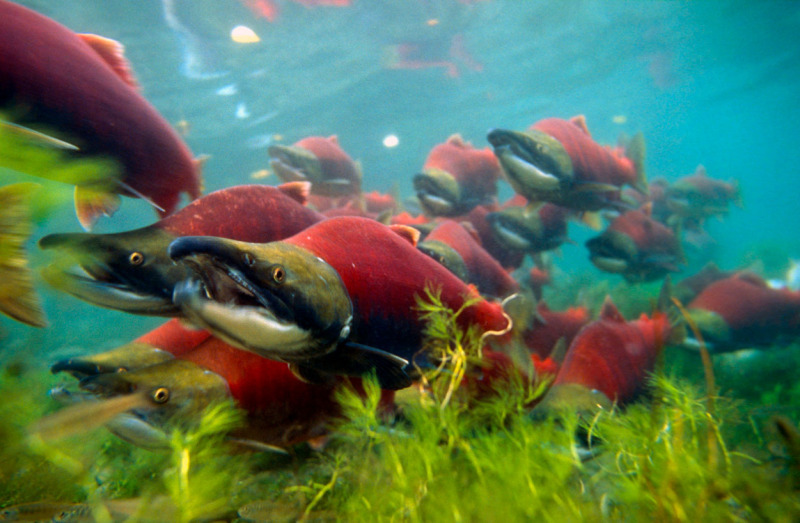
It’s WWF Water Wednesday, when Love Nature television explores the unique characteristics, natural history, environmental challenges and threats facing waters and aquatic species in Canada and around the world, hosted by WWF-Canada president and CEO David Miller. Tonight at 9 p.m. ET/PT watch “Two Oceans” and read on about some of the threats facing Salmon in Canada’s waters.
Salmon have a huge cultural and economic significance to Canadians. But the impact salmon have on their environment may be the most significant of all. Salmon are critical components of their ecosystems, helping sustain whales, seals, other fish and inland animals. Even the cedar trees in British Columbia’s coastal rainforest depend on Pacific salmon, harvesting nutrients from remnants of the fish that are left behind by bears.
Yet many of the country’s salmon populations are in trouble. The number of some populations of salmon spawning in Canadian waters has declined for decades, and if the trend continues it could have dire consequences for life in the water and on land. Here are some of the biggest threats facing this iconic and important species and what WWF-Canada is doing about it:
Habitat loss
In order for their eggs to hatch, salmon require gravel beds with clean, cool and oxygen-rich water. Runoff from deforestation, agriculture and industrial development has polluted some of the most productive salmon habitats in the country. Damming rivers for hydroelectric power, irrigation and flood control has furthered habitat loss by altering environmental flows and fragmenting habitat. Anadromous fish like salmon are particularly sensitive to these practices, which can impede their migration and prevent them from returning to their spawning grounds.
● To better understand the health of rivers that salmon depend on, WWF-Canada is completing the first nationwide assessment of Canada’s watersheds, which will provide new insights into how threats like pollution and overuse of water are affecting the health of our freshwater ecosystems.
● In British Columbia, WWF-Canada worked with water experts and practitioners and provincial government ministries to share ideas and experiences on protecting environmental flows, and then pushed for the implementation of the new Water Sustainability Act to ensure water for rivers and fish is protected.
● WWF-Canada is also working to ensure that government and other stakeholders take into account the cumulative effects of multiple activities on watersheds. In the Skeena estuary, for example, we have been working to ensure important habitats are protected under the Marine Plan Partnership.
● WWF-Canada supports local stewardship groups working to restore and protect habitat through the Loblaw Water Fund.

Climate change
It’s not just British Columbians who have noticed the abnormally hot and dry weather on the West Coast. Last year’s low water levels and above-average temperatures were lethal to many sockeye salmon. In the Fraser River, water levels hit extreme lows as water temperatures went as high as 19 degrees Celsius. Research has shown that once the water gets this warm, salmon start to show signs of physiological stress and slow their upstream migration. At this temperature, even a one-degree increase can lead to disease outbreaks and death, often before the fish have had the opportunity to spawn.
● WWF-Canada has included climate change in the national watershed assessments and found that a changing climate is already impacting BC watersheds. The issue of temperature change in our rivers is a priority issue that requires more immediate action.
● Among other actions, WWF-Canada is working with researchers at the Waterloo Institute for Sustainable Energy to map renewable energy potential across the country. We recently assessed the financial feasibility of renewable energy in Canada’s north.
Overfishing
Overfishing is a global problem that affects countless species, including Atlantic and Pacific salmon. When salmon numbers are low, and the amount of fish being caught isn’t properly managed, too few are able to return to their natal streams and spawn the next generation.
● WWF-International is working with the fishing industry to combat overfishing and put better controls in place so that fisheries are sustainable, even as our reliance on ocean resources increases.
Intrigued by salmon? Read 10 amazing facts about salmon here.
